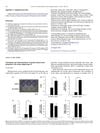 30 citations,
June 2017 in “Current stem cell research & therapy”
30 citations,
June 2017 in “Current stem cell research & therapy” Adipose-derived stem cells (fat cells) show promise in treating hair loss in both men and women.
 29 citations,
December 2012 in “Fibrogenesis & Tissue Repair”
29 citations,
December 2012 in “Fibrogenesis & Tissue Repair” Adult stem cells are important for tissue repair and have therapeutic potential, but more research is needed to fully use them.
 12 citations,
November 2015 in “Cell Death & Differentiation”
12 citations,
November 2015 in “Cell Death & Differentiation” Inflammation helps stem cells repair tissue by directing their behavior.
11 citations,
July 2012 in “Experimental dermatology” Innate immunity genes in hair follicle stem cells might have new roles beyond traditional immune functions.
 11 citations,
June 2012 in “Journal of Dermatological Science”
11 citations,
June 2012 in “Journal of Dermatological Science” Scientists identified a group of human skin cells with high growth and regeneration potential.
 9 citations,
March 2011 in “Current Pharmaceutical Biotechnology”
9 citations,
March 2011 in “Current Pharmaceutical Biotechnology” Stem cell therapies show promise for treating various diseases but face challenges in clinical use and require better monitoring techniques.
 7 citations,
February 2018 in “InTech eBooks”
7 citations,
February 2018 in “InTech eBooks” Biomaterials combined with stem cells show promise for improving tissue repair and medical treatments.
7 citations,
January 2022 in “Biomedicines” Cells from the lower part of hair follicles are a promising, less invasive option for immune system therapies.
 6 citations,
May 2021 in “Stem Cell Reviews and Reports”
6 citations,
May 2021 in “Stem Cell Reviews and Reports” Newly found stem cells in horse hooves show promise for treating a hoof disease called laminitis.
 4 citations,
April 2012 in “Medical Hypotheses”
4 citations,
April 2012 in “Medical Hypotheses” Finasteride may improve stem cell therapy for heart attacks by increasing cell survival.
 3 citations,
June 2023 in “MedComm”
3 citations,
June 2023 in “MedComm” Stem cells and their exosomes show promise for repairing tissues and healing wounds when delivered effectively, but more research is needed on their tracking and optimal use.
 3 citations,
January 2014 in “Elsevier eBooks”
3 citations,
January 2014 in “Elsevier eBooks” Different stem cells have benefits and challenges for tissue repair, and more research is needed to find the best types for each use.

Stem cells can improve skin grafts by enhancing blood flow and hair growth.

Limbal Mesenchymal Stem Cell Secretome might help heal eye injuries by reducing inflammation and promoting tissue repair.

Low-level laser therapy may help stem cells grow and function better, aiding in healing and tissue repair.

Chemicals and stem cells combined have advanced regenerative medicine with few safety concerns, focusing on improving techniques and treatment effectiveness.
 January 2012 in “Springer eBooks”
January 2012 in “Springer eBooks” The skin has different types of stem cells that can repair and regenerate tissue.
 December 2023 in “Aggregate”
December 2023 in “Aggregate” Scientists are using clumps of special stem cells to improve organ repair.
 132 citations,
August 2012 in “Biochimica et Biophysica Acta (BBA) - General Subjects”
132 citations,
August 2012 in “Biochimica et Biophysica Acta (BBA) - General Subjects” TGF-β signaling is crucial for stem cell maintenance, differentiation, and has implications for cancer treatment.
 83 citations,
January 2015 in “World Journal of Stem Cells”
83 citations,
January 2015 in “World Journal of Stem Cells” Hair follicle regeneration needs special conditions and young cells.
64 citations,
January 2013 in “The journal of investigative dermatology/Journal of investigative dermatology” Human stem cells can help form hair follicles in mice.
 25 citations,
April 2021 in “The EMBO Journal”
25 citations,
April 2021 in “The EMBO Journal” Hair follicle stem cells help maintain skin health and could improve skin replacement therapies.
 16 citations,
October 2018 in “Experimental Dermatology”
16 citations,
October 2018 in “Experimental Dermatology” Mesenchymal stem cell therapy may help treat alopecia areata by promoting hair growth and reducing inflammation.
 8 citations,
January 2017 in “Methods in molecular biology”
8 citations,
January 2017 in “Methods in molecular biology” Stem cells rearrangement regenerates functional hair follicles, potentially treating hair loss.
June 2024 in “Regenerative Therapy” Exosomes from stem cells may help rejuvenate skin and regrow hair, but more research is needed.
 222 citations,
August 2009 in “Experimental Dermatology”
222 citations,
August 2009 in “Experimental Dermatology” Stem cells are crucial for wound healing and understanding their role could lead to new treatments, but more research is needed to answer unresolved questions.
 65 citations,
November 2012 in “Tissue Engineering Part B-reviews”
65 citations,
November 2012 in “Tissue Engineering Part B-reviews” Hair follicle stem cells are a promising source for tissue repair and treating skin or hair diseases.
 35 citations,
January 2017 in “Journal of Dermatological Science”
35 citations,
January 2017 in “Journal of Dermatological Science” Stress can cause early aging in certain skin cells, leading to problems with hair growth.
 29 citations,
March 2020 in “Stem Cell Research & Therapy”
29 citations,
March 2020 in “Stem Cell Research & Therapy” Fat stem cells from diabetic mice can help heal skin wounds in other diabetic mice.
 21 citations,
July 2020 in “Stem Cell Research & Therapy”
21 citations,
July 2020 in “Stem Cell Research & Therapy” Fat stem cells from diabetic mice can still help heal wounds.


























